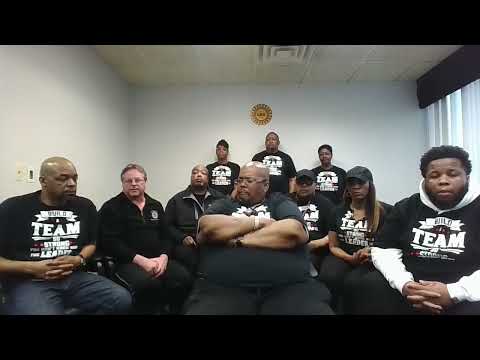Local United Auto Workers leaders representing employees at the Ram 1500 pickup assembly plant in Sterling Heights are decrying efforts by Stellantis NV that they say will cut and combine jobs and likely will result in layoffs.
During an emergency meeting earlier this week, the plant’s management informed the UAW’s plant committee that it plans to eliminate 408 jobs by the end of the June, Local 1700 President Charles Bell said during a video with the local leadership that was uploaded on Friday to YouTube and wrote in a letter to the plant manager that was posted on Facebook. That figure doesn’t translate directly to layoffs, Bell said, but the number is large enough that the company likely would have to do layoffs at the plant that employs almost 6,500 hourly workers.
“Regarding the meeting with the company, it was explained to them that there will be 408 jobs eliminated,” Bell said. “Four hundred eight jobs being eliminated would lead to layoffs. Layoffs are serious, especially when you got layoffs at Trenton Engine, Belvidere, and, from what we were told in the council meeting, several other locations.”
The Detroit News reported earlier this week that Stellantis was conducting an assessment of Sterling Heights Assembly Plant’s efficiency. Because the process is ongoing, the company is unable to comment on what the potential impacts could be or how many jobs could be affected.
CEO Carlos Tavares has emphasized the need to find savings because electric vehicles are 40% more expensive than their internal combustion engine counterparts. He’s said manufacturing operations in North America have room for improvement based on best practices elsewhere, and that U.S. plants’ absenteeism is higher than those in Europe.
Additionally, the industry is starting to see signs of growing economic uncertainty from inflation and higher interest rates. And the automakers could be against tough negotiations with the UAW when contract talks reopen later this year. Stellantis has yet to announce where the all-electric Ram 1500 REV will be built.
“All of the companies are looking for so-called efficiencies or savings in order for them to finance electrification,” said Marick Masters, a management professor at Wayne State University. “This will be the normal course of business. Just because the contract negotiations are coming up doesn’t mean they hold up the transition. They are going to make changes at a time they feel is optimal. The union has to expect this going forward.”
The local leaders, however, said they aren’t standing for the “attack” from Stellantis, echoing calls for unity and militancy displayed earlier this week during the UAW’s national bargaining convention.
“We are definitely under attack,” said Ricky Odum, committeeman representing workers in the body shop. “Robots are coming, especially in my division so rapidly that some of the areas that they are coming in we’ve never heard of being in those areas before, because they are looking for ways to actively reduce the headcount by adding these robots.”
Leaders pleaded that members do their part in keeping focused on their work and put away distractions. They said if workers are asked to do more than one job, they should contact their UAW steward.
“We’re helping them cut our jobs. We have to stop. We’re asking you to please help us help the membership,” said Desiree Slater, a committeeman for the trim department. “No more phones. No more iPads. … We need each other. We are in a war. We’re in a fight.”

As a result of news of the job cuts, the local UAW leaders reneged on attending a townhall held on Friday by the plant’s management seeking to address absenteeism at the plant — a focus for the automaker in recent months to improve quality and costs.
Job cuts have been ongoing for the past two years, Bell told The News. Some affected workers were able to transfer to the new Jeep Grand Cherokee plant in Detroit.
Now, Stellantis is idling indefinitely its Jeep Cherokee SUV plant in Belvidere, Illinois, affecting 1,350 workers. In October, it cut the third shift at its Warren Truck Assembly Plant, though it expects the move to be temporary as it addresses quality concerns on the Wagoneer SUVs and ramps up production of the longer wheelbase version.
The job cuts at SHAP refer to the elimination of “standard jobs,” Bell said. These are positions tracked by the company on a scorecard and are considered necessary to run the assembly line. As standard jobs are cut, the plant, though, has seen an increasing number of “non-standard” jobs that are more flexible. This often pulls in on-call supplemental workers, reducing the number of “floaters” to fill in for absences, which exacerbates absenteeism problems, Bell said.
“Make sure you’re doing what you’re supposed to do,” he said. “They’re walking around and identifying jobs or operations that could be combined or cut. They don’t care if they work on paper to hit reality, but on paper they look good, and it could be a task to do more than the normal operations, which the product will suffer in the end. If something doesn’t look right, get your union involved. … We have to stand together to protect the product.”
bnoble@detroitnews.com
Twitter: @BreanaCNoble
